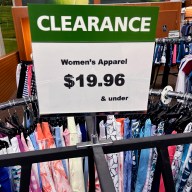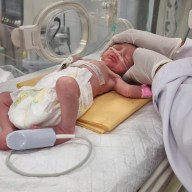JERUSALEM – The Vatican defended Pope Benedict on Tuesday as a man of strong anti-Nazi credentials and a peacemaker in the face of mounting Israeli criticism and Arab anger over the Israeli occupation.
Critics faulted the German-born Pope for failing to apologize in a speech at Israel’s Holocaust memorial for what they see as Catholic indifference during the Nazi genocide, a controversy that threatened to overshadow his high-profile pilgrimage to the Holy Land.
Benedict delivered messages of peace Tuesday while visiting the holiest Muslim and Jewish sites in Jerusalem, the Dome of the Rock and the Western Wall.
“The purpose of this visit is peace,” said Vatican spokesman Rev. Federico Lombardi.
The Pope has been on the receiving end of strident messages from both Israelis and Arabs.
On Tuesday, Grand Mufti Mohammed Hussein handed the Pope a letter complaining about Israeli policies in Jerusalem and appealing for the Vatican’s help in bringing about Palestinian independence.
“We reiterate to you that peace and stability in this country, which have been lacking for decades, can only be achieved with the end of occupation and with our Palestinian people regaining their freedom, their right to self-determination and their other legitimate rights,” it said.
The Pope’s speech at Israel’s national Holocaust memorial Monday attracted widespread attention in Israel, with the parliament speaker accusing Benedict of glossing over the Nazi genocide. The Pope’s own wartime actions – he was forced to join the Hitler Youth and the Nazi army, which he later deserted – have also drawn notice.
“The Pope spoke like a historian, as somebody observing from the sidelines, about things that shouldn’t happen. But what can you do? He was part of them,” said parliament speaker Reuven Rivlin. “With all due respect to the Holy See, we cannot ignore the baggage he carries with him.”
The Pope delivered an emotional address at the Yad Vashem Holocaust memorial, saying the cry of those killed by the regime he grew up under “still echoes in our hearts.” But moments later, Yad Vashem’s top two officials criticized him for failing to use the words “Nazis” or “murder” in his speech.
“One would have expected the Vatican’s cardinals to prepare a more intelligent text for their boss,” columnist Tom Segev wrote in the Haaretz daily.
Lombardi defended Benedict, saying the Pope mentioned his German roots in 2005 when visiting a synagogue in Cologne, Germany, and at the Auschwitz death camp the following year.
“He can’t mention everything every time he speaks,” Lombardi told reporters in Jerusalem.
Despite the controversies, the Pope was warmly welcomed at every stop by Israeli dignitaries, Muslim clerics and Christian followers, who clamoured to greet him as he travelled in his popemobile.
The Holocaust is an extremely sensitive subject in Israel. The Jewish state was founded in the wake of the Nazi genocide of six million European Jews, and more than 200,000 Holocaust survivors live in Israel.
The Vatican’s wartime pope, Pius XII, has been criticized by Jews for doing little to prevent the Holocaust, an accusation the church denies.
More recently, Benedict upset many Jews by revoking the excommunication of a Holocaust-denying bishop. The Pope has acknowledged mistakes in the case, and the bishop remains barred from rejoining the Catholic clergy.
Lombardi has intervened in several recent cases where Benedict’s statements caused uproars, including his questioning of condoms as valid weapons against AIDS on his pilgrimage to Africa.
In his first speech after arriving in Israel on Monday, the Pope pledged to remember the six million Jews killed in the Holocaust and condemned anti-Semitism. And at Yad Vashem, the 82-year-old pontiff met with elderly Holocaust survivors before delivering an eloquent speech.
“May the names of these victims never perish. May their suffering never be denied, belittled or forgotten,” the pontiff, not known for his emotional displays, said in hushed tones.
Benedict has made reconciliation a major theme of his five-day pilgrimage to Israel and the West Bank, and took this message to the most contentious religious site in the Holy Land Tuesday, urging Israel and the Palestinians to engage in “a sincere dialogue aimed at building a world of justice and peace.”
The Pope visited the Dome of the Rock, where Muslims believe the Prophet Muhammad ascended to heaven, and the adjacent Western Wall, revered by Jews as a remnant of the biblical Temple compound in Jerusalem.
Competing claims to the hilltop compound – known to Muslims as the Noble Sanctuary and to Jews as the Temple Mount – have sparked violence in the past. Resolving the dispute has been the most intractable issue during more than 15 years of on-and-off Israeli-Palestinian peace negotiations.
The papal visit included a private meeting with the top Islamic cleric in the Holy Land.
Hussein, the grand mufti, said afterward that he told the Pope of the Palestinians’ suffering “and we asked for justice in this Holy Land.” He also handed the Pope a letter urging the Vatican to use its influence to end Israel’s “aggression” against the Palestinians. Asked how the Pope responded, he replied, “We felt he was receptive.”
At the Dome of the Rock, the most sacred Muslim shrine in Jerusalem and part of the compound that is Islam’s third-holiest site, the Pope removed his red shoes before entering as a sign of respect. A priest helped him slip them back on as he left.
At the Western Wall, Benedict inserted a note between the ancient crevices of Judaism’s holiest shrine, a retaining wall of the second of two biblical temples.
The written blessing asked “the God of Abraham, Isaac and Jacob” to “hear the cry of the afflicted, the fearful, the bereft; send your peace upon this Holy Land, upon the Middle East, upon the entire human family.”
Later Tuesday, the Pope told Israel’s two chief rabbis that the Roman Catholic Church is “irrevocably committed” to “a genuine and lasting reconciliation between Christians and Jews.
One of the rabbis, Yona Metzger, welcomed the interfaith efforts. “We must continue on this path and teach leaders of the other faiths that not by terror will they achieve their aims,” he said.
Jews suffered centuries of persecution at the hands of the church, which traditionally held them responsible for rejecting and killing Jesus. The church disavowed that view in the 1960s, rejected anti-Semitism and started dialogue with other religions.
Benedict’s predecessor, Pope John Paul II, made huge strides in the relationship, asking forgiveness on several occasions, including during his landmark 2000 trip to Israel, for the wrongs inflicted by Christians on Jews.
On Tuesday, Benedict also visited the traditional site of the Last Supper, where he received a warm welcome from some 400 Catholic clergy and worshippers at the Latin Patriarchate.
The pontiff arrived in his popemobile for an outdoor mass next to the Garden of Gethsemane, the site where Christianity says Jesus was arrested. Happy crowds cheered and surged around the vehicle, and the pontiff smiled and waved.
But there, too, politics intruded when Latin Patriarch Fouad Twal, a Palestinian, told the gathering that Jesus is still weeping over Israeli injustices to Palestinians in Jerusalem.
















